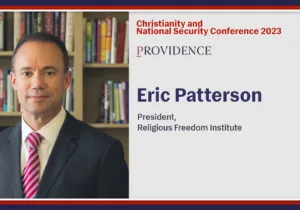It has been an exciting and tumultuous past few months for the conservative movement. There’s the David French-Sohrab Ahmari debate litigating how religious conservatives should approach the public square. There’s also been the birth of the “National Conservative” movement led by the Jewish scholar Yoram Hazony. The French-Ahmari and National Conservative moments are not separate debates. Among other overlapping themes, they both seek to establish a consensus on the role religion plays in forming a cohesive vision for the common good within society.
These debates have probed to the subterranean foundations of statecraft and theology, raising a Gordian Knot of questions: On what basis does a political community hope to preserve itself when there’s no common moral grammar, or a moral grammar so thin that it runs the risk of collapse and anarchy? The new nationalism believes national preservation can be established most securely by a nationalist agenda, one that prioritizes and seeks to privilege the public good of religion. Ultimately, I believe the nationalist agenda cannot cut the Gordian Knot without either instrumentalizing religion or undercutting the reality of religious pluralism.
As I intend to argue in this brief essay, Christians can sympathize with, and even appropriate some of the ideas found in the new nationalism, such as its emphasis on religion and family. But when the final verdict is rendered, it will be a complicated, tenuous, and strained relationship (not to mention all of the negative historical and connotative baggage of the term itself). And at worst, nationalism can impede the trans-national vision for God’s kingdom.
The Kingdom of God and the Kingdoms of Man
The trans-national nature of Christian community means that Christians are not going to define their membership by blood, geography, or tradition. Christianity is trans-national in the sense that it does not limit its membership (or ought not to define itself) based on geography, skin pigment, or tradition. Christianity seeks disciples, the scripture’s state, from “every tribe, tongue, and nation” (Rev. 7:9). This means, necessarily, that an American Christian’s fellowship with an Iranian follower of Christ supersedes loyalty to their American citizenship. That fact poses a problem for nationalism.
In The Virtue of Nationalism, Hazony is strikingly critical of Christianity’s global orientation. He considers it imperial in essence because Christianity aspires to a form of global order. This point may be fair, but it is not a criticism at all. Christians pride themselves on fostering a missionary zeal. We do want citizens from around the world to be united in a worldwide fellowship of like-minded fraternity. Christianity’s emphasis on the person as made in God’s image lends itself toward an open-handedness toward its global neighbors. Our social ethics are not exclusive to one particular ethnos, and neither is the answer to, Who is my neighbor? limited only to whom you share a zip code or heritage with. Christianity insists that in Christ the Gospel creates a “new humanity” (Eph. 2:15). Further, the Great Commission means that the borders of God’s kingdom are porous to the extent that any person responds to the free offer of the Gospel. Please don’t misread that statement: this does not erase national borders and national identity markers as much as it helps triage the loyalties one has in their life. To this nationalist criticism of Christianity’s global network, I simply say, “So be it.”
Community Coherence and Political Legitimacy
But as a matter of sympathy, there are parallels and themes from scripture and reasoned reflection about human experience that deeply resonate with how Christians ought to conceive the nation-state. For one, political authority is ordered by God and legitimate (Rom. 13:1-7). This implies that the political community is taken for granted in scripture. Not all political communities may share the same constitution, yet they do share as the sine qua non of their existence God’s sovereignty, as He orders the nations, and where each person moves and has their being.
As Hazony argues in his book, the typology of Israel’s political and civic culture was a model for how the nation-state came to be conceived. While one could argue that Israel’s civic and political arrangement was descriptive more than prescriptive, the idea that the nation is a foreign concept to the Bible is a fiction. Second, the scripture speaks to communities forming themselves around cohesive frameworks. Whether that be Israel or the New Testament church community, the principle runs through the lineaments of scripture that people gather themselves into group identities ordered toward intelligible purposes. Of course, the metaphor eventually breaks down: The New Testament church is not defined by blood or soil! Israel, as a people, was a nation defined by blood, soul, and religion, while the church is defined by its union with Christ, only. Even still, it is reasonable to conclude that a community that understands itself as religious will order itself around religious purposes and will seek to have that religious identity inform their laws and constitutions, which is one of the goals of the new nationalism. Though there are questions about what this means for religious liberty, public sentiment expressed through representation and law is necessary for political legitimacy.
If nationalism is about accepting that the God of the Bible decrees the context of where people live and how a culture around these habitats form, it seems hardly consequential at all to acknowledge that something legitimate exists about a concept such as nationalism.
Instrumentalizing Religion
The problem with the nationalist overtures to religion’s social utility is that it runs the risk of instrumentalizing religion. This is, admittedly, inevitable to the degree that conversion happens on a mass scale and then informs the norms and values of a given political community. Christians can rail against American civil religion and Bible Belt cultural totems (and I have!), but we must also be intellectually honest enough to admit that Christianity influenced our culture and thus the civil religion that we criticize. So what do we want? A marginal-yet-doctrinal Christianity with no influence, or a Christianity with influence that is doctrinally hollow? The new nationalist religious impulse is vague, and it’s unclear what wards off potential abuse and instrumentalizing of religion. What are the particulars of a newfound emphasis on religion? What do they want? Revival? A Third Great Awakening?
And finally, nationalist conservatism’s religion impulse will forever be constrained by internal contradictions on such things as religious liberty. If a cohesive national identity requires some form of religious-political common ground, where does that leave religious minorities? While “religious liberty” might be granted in theory or perhaps in a matter of legal equality, what will result is a form of religious tolerance that makes religious minorities de facto second class citizens. History’s witness shows that a dominant religion meant for the public good has often become domineering.
Conclusion
If the new nationalism is seeking to show how exhausting the excesses of libertarian social forces are, then Christians should take note of a movement that may capably puncture a sacred cow that has for too long defined American conservatism. We need a conservatism that re-enchants the family, that refuses to kowtow to an encroaching drug culture, that calls men to active presence at their family dinner table. We need a conservatism that calls out fornication without reducing sexual ethics to rigid Puritanism. We need a conservatism of restraints and limits. Perhaps national conservatism can be a vehicle for that.
If, however, the new nationalism is a mask for illiberalism, civil religion, and stifling hegemonies, then Christians should chasten themselves from joining a movement that may be more interested in power than rightly ordered tradition. If the new nationalism is a religious jingoism reducible to Boy Scout merit badges, then no thanks.
As a Christian, one can love their nation-state, but civil love should not eclipse the agape love of the Kingdom of God. Christians should never be less than loyal citizens of their political communities (depending, of course, on what “loyalty” means), but they must also be more.







 Sponsor a student for Christianity & National Security 2024
Sponsor a student for Christianity & National Security 2024